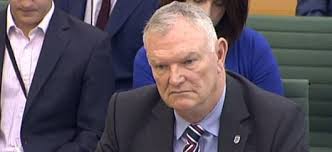By Andrew Warshaw
November 11 – As inappropriate gaffes go, they don’t come much more untimely. Just as he was locked in a public and hugely anticipated debate with members of parliament on the subjects of inclusion and diversity, so English football boss (make that EX-football boss) Greg Clarke goes and puts not one but both feet in it.
First he referred to black players as “coloured”. Then he suggested South Asians had “different career interests” to other ethnic minorities. Then he dug himself into a deeper and even more inextricable hole, first by suggesting being gay was a “life choice”, then declaring that he had been told the lack of female goalkeepers was down to them being afraid of being hit by the ball.
Talk about the worst possible context. Talk about a cumulative own goal and a public relations disaster.
And just when his organisation was seeking to lead the way on anti-discrimination with a new diversity code that aims to ensure more candidates from ethnic minorities can land top jobs.
Just when, too, the issue of almost exclusively white male domination of English football’s senior leadership positions had become such a sensitive talking point. You really couldn’t make it up.
It was hardly surprising therefore that Clarke’s almost immediate resignation on Monday (he was already under pressure over his role in Project Big Picture which sought to radically overhaul the English game but was quickly scrapped) made headline news across the global sporting world.
And not just because of what he said.
Clarke, 63, is also a FIFA vice-president, which comes with an annual stipend of $250,000, and sat on its ruling council – high-profile positions that will surely now also be terminated.
Article 33.8 of the FIFA statutes reads: “Any vice-president or other member of the Council who is permanently or temporarily prevented from performing his official function shall be replaced by the members of the relevant confederation which elected such vice-president or member for the remaining period of office.”
In other words, the roles are now vacant, another kick in the teeth for English football’s authority on the global stage (and potentially its bid to jointly stage the 2030 World Cup) as well as a throwback to a succession, over decades, of governance scandals and debacles which optimists hoped would be a thing of the past following the appointment of Clarke four years ago when he was touted as a gifted and smart operator.
Suddenly, after he paid the heaviest price for, as he put it during a passionate apology, “sometimes tripping over my words”, we are back in familiar territory with another clean-up job required by whoever takes over from Clarke long-term, both on the domestic and international front.
Few would imagine he intended to be deliberately offensive in an era of political correctness, but his comments were understandably roundly condemned by just about everyone who is anyone in the world of racial inclusivity in football.
Kick it out chairman Sanjay Bhandari described Clarke’s words as “outdated” and represented a “big step backwards” in achieving greater diversity within the game.
“This is not about one word that he used, this is about a litany of lazy stereotypes. That’s what has done for him.”
Bhandari’s point was that it’s the job of the man at the top of one of the world’s biggest sporting organisations to get it right.
What Bhandari didn’t say, but might have wondered, is how many other times Clarke, who had a far greater responsibility than most mere mortals to choose his words carefully, had tripped over his words in private away from the cameras.
David Bernstein, one of Clarke’s predecessors, told the BBC: “I am just surprised that the chair of any organisation who’s got a feel of what’s going on in the year 2020 could use those types of words, that sort of language. It’s just inappropriate.”
With sportsmen all over the world taking the knee since the death of George Floyd, which sparked global Black Lives Matter protests, Clarke being forced to fall on his sword will serve to re-open the thorny question of whether the laudable gesture is having the desired effect.
Just as importantly, it will fuel calls for a younger, more “of their time” successor. Someone more socially aware and more au fait with the need to deal responsibly with inclusion and root out antiquated language across all areas of football – from grassroots level upwards.
Last chance saloon? Not quite but a hugely significant appointment at a crucial time.
Contact the writer of this story at moc.l1734837494labto1734837494ofdlr1734837494owedi1734837494sni@w1734837494ahsra1734837494w.wer1734837494dna1734837494

